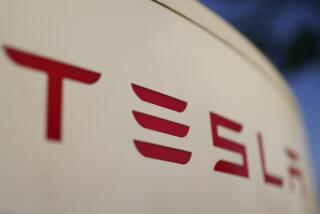There May Be a Future in Your Ford Rumor
- Share via
One of the more intriguing stock market speculations currently is the run-up in Lockheed, the aerospace company, on rumors that Ford Motor--or Chrysler, or General Electric--was going to launch a takeover bid.
Lockheed stock has risen by almost $10 a share--from under $44 to $53.75--in three trading days, although by the market’s close on Thursday it appeared to be settling down, evidently because rumors run out of steam when none of the companies will comment on them. A similar rumor sent Lockheed up more than $10 a share to around $60 back in November, but nothing came of it.
So one thing to keep in mind is that the stock of the big military contractor, the maker of Trident missiles and C-5 airlift planes, can go down as much as it goes up on these recurring rumors. And there are ample grounds for skepticism. But it is also undeniable that the stock’s repeated leaps suggest that serious institutional investors think enough of the rumor to put real money on it. So the obvious question is: Why should people think Ford or another company would be interested in buying Lockheed?
‘Treasure House’
The quick answers are: because aerospace companies are recognized as technologically excellent, because Ford has an enormous amount of spare cash lying around and--perhaps most intriguing--because some Wall Streeters, looking long term, see earthbound car makers moving into space travel.
“Lockheed,” says one of the aerospace industry’s leading analysts, “is a technology treasure house.” The analyst, who asks not to be quoted on rumors, thinks like many others that the automobile companies would benefit from access to aerospace know-how in electronics, in specialty metals and other materials and in advanced manufacturing techniques--the systems engineering on big projects that are the aerospace industry’s stock in trade.
That line of thinking correctly recognizes that the aerospace companies, most especially Lockheed, are nifty high-tech outfits--notwithstanding the infamous $800 hammers that result from contractual glitches with the government.
Lockheed has been making the Trident submarine-launched missile efficiently for the last 20 years and is now embarked on production of an advanced version of Trident. It does super-secret work on the Stealth fighter and is one of the candidates to build the advanced tactical fighter when that job is awarded in the mid-1990s. Lockheed also is a leader in space research, aviation electronics and sophisticated computer software.
Such thinking also recognizes that today’s automobiles are getting more and more of their advanced components from the aerospace industry. TRW, long a supplier to Detroit, is now offering electronic steering controls as potential replacements for bulkier electromechanical steering columns. United Technologies supplies electronic dashboards to Ford. Even the new driver’s seats, with their automatic back supports and ease of maneuvering, are supplied by an aerospace company--Lear Siegler.
Topped Ford Bid
Throw in the fact that when General Motors bought Hughes Aircraft two years ago, it topped a bid by Ford to do so, and it is easy to see why Wall Street is slow to dismiss rumors--especially when analysts take a look at Ford’s cash hoard.
The No. 2 auto maker, which had $52 billion in revenue in 1986, ended the year with $8.5 billion in cash and marketable securities in its balance sheet. Ronald Glantz, automobile analyst for Montgomery Securities, calculates that if Ford makes no acquisition it will have $14 billion in cash sometime in 1988.
The money is rolling in because Ford’s new cars are selling and because of the shift in values of the dollar and the yen. With the yen up 70%, Japanese car makers have been raising their prices and this has allowed Ford to raise its prices. So the company is making big profits.
But a little skepticism is in order. Ford isn’t eager to spend those surging profits. The company doesn’t want to expand its plants in good times only to be left with excess capacity in the inevitable downturn. And Ford Chairman Donald E. Petersen said early in May that the company was “reluctant” to make acquisitions now with the stock market so high.
Also, though it is far too early to make judgments, the skeptic might ask what benefit General Motors has gained from its ownership of Hughes Aircraft. An auto maker doesn’t need to own the missile maker in order to buy aerospace technology, after all.
Still, if today’s automobile companies think of the long-term future only in terms of cars and highways, they risk going the way of the carriage and buggy-whip makers before them. Instead, what corporate directors should be thinking--and may be thinking these days with stock prices high and cash coffers bulging--is how to invest money now to assure the company’s future into the 21st Century.
And that is when thoughts might well turn to space technology and to one of the world’s superb companies, Lockheed. There could be vision, in other words, behind what so far is only rumor.
More to Read
Inside the business of entertainment
The Wide Shot brings you news, analysis and insights on everything from streaming wars to production — and what it all means for the future.
You may occasionally receive promotional content from the Los Angeles Times.










